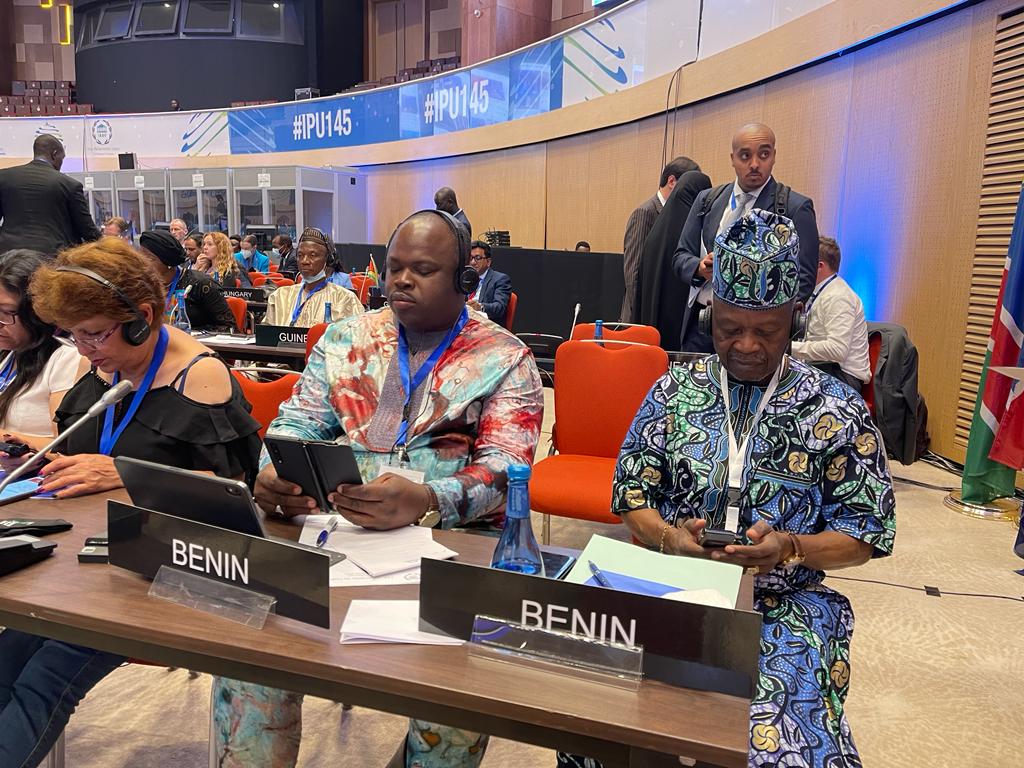Representation of women in the National Assembly; Benin in a good dynamic
Benin, which has never had more than 8% of women parliamentarians, will now have a minimum of 27% of seats reserved for women in the upcoming parliamentary elections on 8 January 2023.
This according to Mr. Dakpè Sossou, the second vice-president of the National Assembly of Benin, who led the Benin delegation to the 145th IPU Assembly in Kigali Rwanda, is an effort to allow women to participate in the competition as well.
In a presentation on behalf of the President of the National Assembly of Benin on the theme “Gender equality and gender-sensitive parliaments: drivers of change for a more resilient and peaceful world”, Mr. Dakpè Sossou said that the dynamics of Rwanda is a major step in achieving gender equality in Parliament, calling for the need to value women’s political activity based on this example.
The Republic of Benin, he said, recognizes women as the main holders of the economic product, and since 2016, bold reforms have been undertaken at all levels to ensure the equitable participation of women in all sectors of life.
“Benin participates in these meetings with the message of the need to renew our modernity in our traditions that value women and give them eminent roles equal to men” he stated.
“If these amazons can be warriors, as they say, they have been and still are, how can we not work to promote gender equality at the professional, economic, social and political levels. We must win this challenge, because to meet the great challenges of sustainability and resilience to the effects of climate change, to build a global society of peace, stability and collective security, no human being should be excluded, marginalized because of race, religion, even less gender opinion that women have not chosen,” Sossou declared.
He also informed the participants that, in order to provide a solid basis for reforms to promote gender equality, Benin has undertaken a broad constitutional reform through the National Assembly, which resulted in a substantial revision of the Constitution of 11 December 1990 in November 2019.
“Not with the opportunist aim of hindering the alternation of power, which Benin can boast about since the advent of democratic renewal in the aftermath of the historic conference of February 1990, nor with the opportunist aim of hindering the alternation of power, but create the conditions for strong and sustainable inclusion of women in various development processes, including the promotion of women’s political leadership.”, said Honorable Sossou.
According to him, despite the increase in enrollment of girls due to the free educational policies that have been in place in the country for decades, it is clear that many girls are unable to complete their basic education. This is due to the fact that students often drop out of school for reasons of early marriage, especially in rural areas, he added.
It is in this context that the National Assembly of Benin passed a law that criminalizes all girl marriage before the age of 18. Now, under this law, parents, marriage organizers, religious and traditional leaders are liable to imprisonment for up to five years, with fines to deter them from committing such acts.
Further, Dakpè Sossou said that the multiple school interruptions that affect girls in primary and secondary school are caused by early or unwanted pregnancies, or career interruptions for women after pregnancy. It is in this light that the National Assembly made adjustments to the abortion law.
“Now, in addition to health factors, post-rape pregnancy situations, the law introduces two new conditions that can allow the woman to abort if she wishes, if she is in a school situation and thinks that the pregnancy contracted can be a handicap for further education, or if she is in a professional career that a pregnancy can possibly interrupt or upset,” he said.
Mr. Dakpè Sossou noted that although Parliament has passed the law, the debate on how to implement it is far from over in Benin society. Parliament is accused of being too far ahead of the moral state of society. It is sometimes at this price that national representation can drive almost revolutionary reforms to impact society and promote gender equality.”, he said.
Additionally, the Vice President informed that in order to give girls or women a better chance to study and achieve a respectable position and professional life, the National Assembly has passed a very repressive law against sexual harassment, especially in schools and universities.
He revealed that law enforcement has resulted in the incarceration of several teachers, including university professors. Adding that the Women’s Institution has been created not only to promote research on gender equality, but also to serve as an observatory and advocate for women’s rights against all forms of violence, abuse and marginalization.
During the five-day meeting of parliaments and their representatives from around the world, members affirmed that gender equality is essential to address pandemics, conflicts, economic recessions and climate change. From an economic perspective, gender equality means equal pay, financial inclusion, universal social protection, valuing care giving, and protection from discrimination and violence.
They said equality in the economy also means more women participating in the workforce, which increases prosperity and productivity. Indeed, gender equality in politics makes it possible to respond better to crises by taking into account diverse needs, which produces more effective results.
From the perspective of peace building and diplomacy, participants recognized women’s leadership as a driving force, as peace agreements signed by delegates lead to a more sustainable peace.
They also said that in political decision-making, women leaders have been a driving force behind stronger climate action. Therefore, when it comes to addressing global challenges, it is no longer normal that no one is left behind if women participate and lead.
According to the declaration, the commitment to gender-sensitive parliaments today must be more ambitious than it was ten years ago. They pledged to take ten steps to make many parliaments more gender-sensitive over the next decade.
These statements include assessing the level of sensitivity of parliaments to gender issues twice to ensure progress between the two stages. The creation of a joint steering committee to monitor the findings and recommendations of gender-sensitive assessments that have the authority, resources and mandate to lead reforms.
Again, they agreed on the need to recognize the individual differences between women and to prioritize the inclusion of under-represented groups such as young women, aboriginal women, and women with disabilities.
They also agreed to create resources and empower a gender equality committee or a similar body that can effectively hold the government and Parliament to account. and a women’s caucus that can effectively support women parliamentarians in their parliamentary work.
Also in the declaration, they will adopt formal rules to establish gender balance in all parliamentary leadership positions, ensure gender parity in all parliamentary activities, and ban committees and unisex groups.
In addition, they aim to mobilize male parliamentarians and other men active in the parliamentary ecosystem to act as allies for gender equality, including by co-sponsoring bills, initiatives and actions with women parliamentarians, in the areas of legislation, monitoring and representation.
Again, they are prepared to ensure that gender sensitivity, gender equality and gender mainstreaming and budgeting guide all of Parliament’s work at all times.
They will not only carry out gender audits of legislative, budgetary and control actions, but also initiatives to introduce or reform, among other things, parliamentary technology, measures to make parliaments greener, initiatives to involve citizens in the work of parliament, and to implement the respective recommendations of these audits.
The IPU’s 145th declarations aim to become benevolent parliaments by fully meeting the needs of parliamentarians and their staff in the exercise of their parliamentary functions.
Finally, put in place rigorous policies aimed at zero tolerance for violence against women, sexual harassment and intimidation in Parliament, and establish independent and effective grievance procedures with severe penalties.
Story By: Florence D.Y. GBOLU





